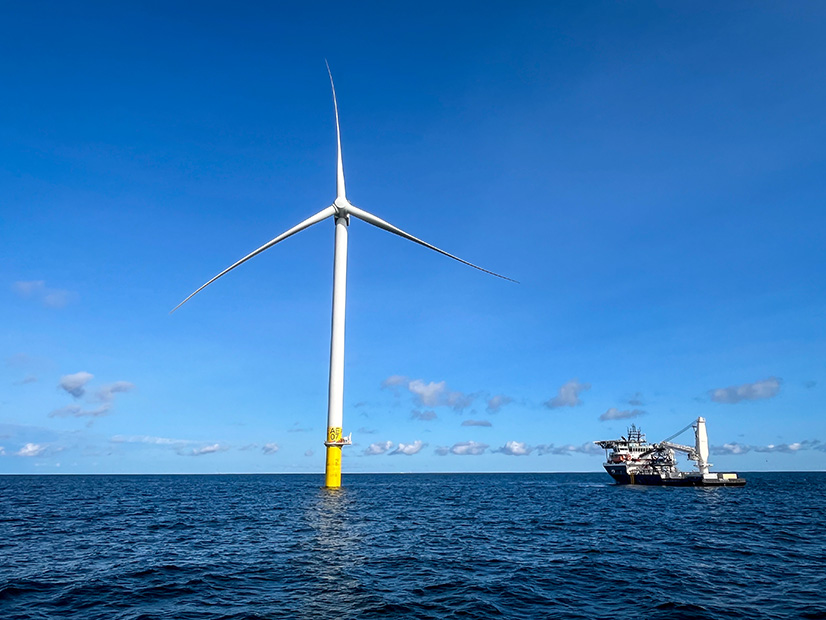
A one-in-a-thousand problem with a key foundation component is the latest setback in U.S. waters for Ørsted and is blamed for its latest nine-digit cost impairment.
The Danish offshore wind giant revealed the new problems with Revolution Wind in its third-quarter earnings report Nov. 5 but balanced it out with some good news: It was able to reverse significant portions of previously recorded impairments on Sunrise Wind, resulting in a net impairment for the quarter of $42 million rather than $228 million.
Offshore work began this year for Revolution and is expected to begin next year for Sunrise. Onshore work for Sunrise is underway.
It is the second setback in as many quarters for Revolution, a 704-MW wind farm that will feed into Connecticut and Rhode Island.
With its second-quarter financial report in August, Ørsted announced that the environmental contamination at the site for Revolution’s onshore substation was worse than initially thought, so the cleanup would take longer. This pushed the projected completion date back from 2025 to 2026. (See Revolution, Sunrise OSW Projects Face New Delays.)
During a Nov. 5 conference call with financial analysts, CEO Mads Nipper said there are potential problems with the monopile driven into the seabed for Revolution’s offshore substation.
“Although it has been safely driven to the target depth, it may not be suitable for use as currently installed,” he said. “The cause is likely to be related to the resistance within the seabed soil.”
This has happened only twice before with the more than 2,000 offshore wind foundations Ørsted has installed worldwide, Nipper said.
“Using our extensive experience, our team [is] assessing the root cause and establishing the best part forward for the project.”
As a precaution, the company has exercised its option to extend the contracted services of one of the installation vessels working on site. These ships typically command extremely high per-day charges, and Nipper said the cost was higher than anticipated.
Ørsted is taking an impairment of $175 million because of these developments, raising Revolution’s total impairment for the first nine months of this year to $514 million.
Aside from all this, Nipper said, the project is proceeding well.
No new problems have cropped up with the onshore substation, and steady progress is being made offshore: 52 foundations, 20 array cables and nine turbines are in place. No further delays are expected in the commercial operation date.
The team will suspend monopile installation from Dec. 1 to April 30 but plans to continue turbine installation through the winter.
During the call, CFO Trond Westlie alluded to the many moving pieces of the offshore wind industry and world economy, and to their potential continued impact on the financials of Ørsted and Revolution Wind: “Let me remind everyone again that as we have had to recognize impairments on these projects in the past, any changes to the business case, including movement to the interest rates, are likely to lead to further adjustment to the impairments, as there is no headroom.”
But things eventually should get better, he added: “It is important to keep in mind that once the projects are operational, they will contribute with significant earnings and cash flow throughout their lifetime.”
When Nipper and Westlie completed their presentations, they fielded questions for nearly an hour, including:
Q: Are you concerned that Donald Trump if elected would revoke the investment tax credit adders?
A: We are assuming 40% and see minimal risk of that changing.
Q: What portion of the components of Revolution Wind and Sunrise Wind are foreign, and what would be the impact of tariffs imposed by a new president?
A: I cannot give you a percentage off the top of my head. Many of the major components of Revolution are already onshore, awaiting installation, and the phase-in period for any new tariffs should make their effects manageable.
Q: Are there any other significant known unknowns with Revolution that could create problems in the next few quarters?
A: We can never say that there are no risks left in a project until it is done. But with what we know now, we do feel comfortable calling this a robust project.
Q: With all the problems so far with Revolution, do you think you have made enough contingencies for Sunrise?
A: We, of course, are assessing that all the time. With our current knowledge, yes, we do.



